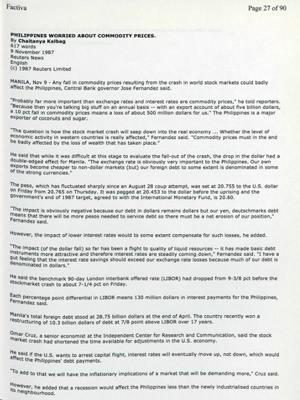PHILIPPINES WORRIED ABOUT COMMODITY PRICES
[Reuters]
Published date: 9th Nov 1987
9 November 1987
Reuters News
English
(c) 1987 Reuters Limited
MANILA, Nov 9 – Any fall in commodity prices resulting from the crash in world stock markets could badly affect the Philippines, Central Bank governor Jose Fernandez said.
“Probably far more important than exchange rates and interest rates are commodity prices,” he told reporters. ‘Because then you’re talking big stuff on an annual basis — with an export account of about five billion dollars, a 10 pct fall in commodity prices means a loss of about 500 million dollars for us.” The Philippines is a major exporter of coconuts and sugar.
“The question is how the stock market crash will seep down into the real economy … Whether the level of economic activity in western countries is really affected,” Fernandez said, “Commodity prices must in the end be badly affected by the loss of wealth that has taken place.”
He said that while it was difficult at this stage to evaluate the fall-out of the crash, the drop in the dollar had a double-edged effect for Manila, “The exchange rate is obviously very important to the Philippines. Our own exports become cheaper to non-dollar markets (but) our foreign debt to some extent is denominated in some of the strong currencies.”
The peso, which has fluctuated sharply since an August 28 coup attempt, was set at 20.755 to the U.S. dollar on Friday from 20.765 on Thursday. It was pegged at 20.453 to the dollar before the uprising and the government’s end of 1987 target, agreed to with the International Monetary Fund, is 20.60.
The impact is obviously negative because our debt In dollars remains dollars but our yen, deutschmarks debt means that there will be more pesos needed to service debt so there must be a net erosion of our position,” Fernandez said.
However, the impact of lower interest rates would to some extent compensate for such losses, he added.
“The impact (of the dollar fall) so far has been a flight to quality of liquid resources — it has made basic debt instruments more attractive and therefore interest rates are steadily coming down,” Fernandez said. “I have a gut feeling that the interest rate savings should exceed our exchange rate losses because much of our debt is denominated in dollars.”
He said the benchmark 90-day London Interbank offered rate (LIBOR) had dropped from 9-3/8 pct before the stockmarket crash to about 7-1/4 pct on Friday.
Each percentage point differential in LIBOR means 130 million dollars in interest payments for the Philippines, Fernandez said.
Manila’s total foreign debt stood at 28.75 billion dollars at the end of April. The country recently won a restructuring of 10.3 billion dollars of debt at 7/8 point above LIBOR over 17 years.
Omar Cruz, a senior economist at the Independent Center for Research and Communication, said the stock market crash had shortened the time available for adjustments in the U.S. economy.
He said if the U.S. wants to arrest capital flight, interest rates will eventually move up, not down, which would affect the Philippines’ debt payments.
To add to that we will have the inflationary implications of a market that will be demanding more,” Cruz said.
However, he added that a recession would affect the Philippines less than the newly industrialised countries in its neighbourhood.
They have irreplaceable markets, they just cannot react quickly,” Cruz said. “We are still small-fry and can diversify. Our growth need not be externally led. We are looking to rising consumer demand to prime the economy.”
He said Manila would be comfortable if commodity prices stayed at their current levels.






